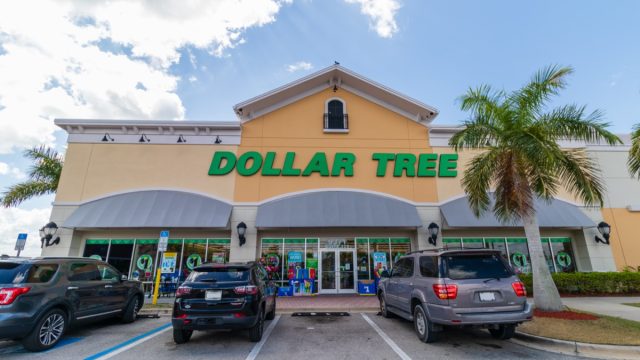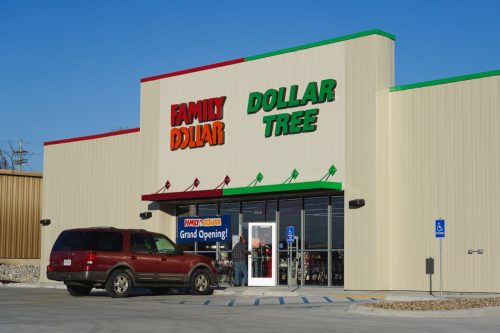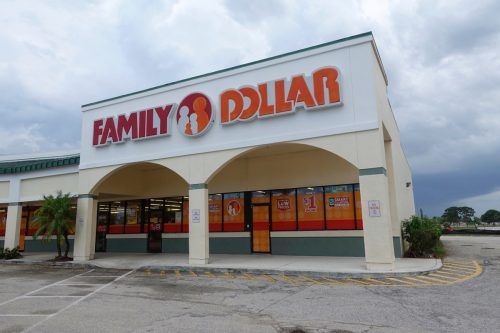Dollar Tree Is Under Fire for These Major Controversies

While anyone would be hard-pressed to pass up a good deal while shopping, few retailers come close to what dollar stores offer. These stores are continuing to expand exponentially across the nation, even as other retailers have been forced to close locations over the last few years. Having paved its way as one of the most prolific dollar store companies, Dollar Tree operates more than 16,000 stores across the U.S. and Canada, and the company is already set to open 590 new stores in 2022. But the retailer’s planned growth might be in jeopardy, as the company has found its name splashed across headlines more and more recently—and not for good reasons. Over the last few months, Dollar Tree has been entangled in a number of major controversies, which have prompted significant backlash and calls for a potential boycott. For a chronological recap on the company’s recent troubles, read on.
READ THIS NEXT: Walmart and Dollar General Are Under Fire for Doing This to Customers.
Dollar Tree made a controversial change to its pricing structure in November.

For years, Dollar Tree had been revered for being one of the only dollar stores to stay true to its name by actually selling its products for just $1. But in 2019, the company made its first departure from this price point when it began opening new Dollar Tree Plus stores, which offered sections of items for $3 to $5. In Nov. 2021, after testing higher prices at some of its original stores just months prior, Dollar Tree shocked customers by announcing that it would be raising the cost of most of its products across all stores to $1.25.
“For 35 years, Dollar Tree has managed through inflationary periods to maintain the everything-for-one-dollar philosophy that distinguished Dollar Tree and made it one of the most successful retail concepts for three decades,” the discount chain said in an announcement. “However … the company believes this is the appropriate time to shift away from the constraints of the $1.00 price point.”
Unsurprisingly, the decision drew criticism from a number of its loyal shoppers, CNN reported in Jan. 2022. Some customers went so far as to say that the price hike made them “sick to [their] stomachs,” according to the news outlet. “We all, in the Dollar Tree community, hoped it wouldn’t happen,” a retail video blogger going by the name Scent Maven told CNN, saying that $1 was a price “you could count on.”
READ THIS NEXT: The 7 Worst Things to Buy at Dollar Tree.
The company was hit with an FDA investigation at the beginning of the year.

Dollar Tree doesn’t only operate low-price stores in its own name. The company also owns Family Dollar after acquiring the brand in 2015, and at the beginning of this year, several Family Dollar stores were at the center of an investigation by the U.S. Food and Drug Administration (FDA).
Following a consumer complaint, the agency began an inspection of the Family Dollar distribution facility in West Memphis, Arkansas, in Jan. 2022. According to the FDA, the inspection revealed a number of unsanitary conditions in the facility, including a major rodent infestation where more than 1,100 dead rodents were uncovered following a fumigation.
“Families rely on stores like Family Dollar for products such as food and medicine. They deserve products that are safe,” FDA Associate Commissioner for Regulatory Affairs Judith McMeekin, PharmD, said in a Feb. 18 statement. “No one should be subjected to products stored in the kind of unacceptable conditions that we found in this Family Dollar distribution facility. These conditions appear to be violations of federal law that could put families’ health at risk. We will continue to work to protect consumers.”
The company had to temporarily close hundreds of stores in February.

According to The New York Times, Dollar Tree Inc. confirmed on Feb. 19 that as a result of the FDA’s investigation, it had temporarily closed more than 400 Family Dollar stores across six states: Arkansas, Alabama, Louisiana, Mississippi, Missouri, and Tennessee. “Conditions observed during the inspection included live rodents, dead rodents in various states of decay, rodent feces and urine, evidence of gnawing, nesting and rodent odors throughout the facility, dead birds and bird droppings, and products stored in conditions that did not protect against contamination,” the FDA said in a consumer alert.
But that’s not all. On Feb. 18, the company also initiated a voluntary recall of several FDA-regulated products that were stored and shipped from the distribution center in West Memphis to stores in the six states. Family Dollar spokesperson Kayleigh Campbell said in a statement that the company “temporarily closed the affected stores in order to proficiently conduct the voluntary recall.”
RELATED: For more retail news delivered straight to your inbox, sign up for our daily newsletter.
Shoppers started threatening to boycott the company in March.

Dollar Tree started slowly reopening the closed Family Dollar stores in March, Memphis-based news site The Commercial Appeal reported. But according to the news outlet, a group of shoppers who serve as community leaders in Memphis began calling for a potential boycott against the company at the same time. The Memphis Baptist Ministerial Association held a press conference on March 1 where leaders like Rev. Rickey Dugger Sr. and Patricia Rogers said that Dollar Tree will need to make more tangible actions to regain community trust after the FDA investigation.
“We’re asking them to make a collective effort to clean up, and clean up their act,” Dugger said, adding that they are not yet calling for an actual boycott of the company’s stores but that they are advising congregations to be mindful of what they’re purchasing.
READ THIS NEXT: 7 Secrets Dollar Tree Doesn’t Want You to Know.
Last month, Dollar Tree had to recall more than one million units of one product.

One of Dollar Tree’s most recent controversies also involves a massive and concerning recall. The Consumer Product Safety Commission (CPSC) announced on April 14 that the company had issued a recall of more than a million Crafter’s Square Glue Guns sold at both Dollar Tree and Family Dollar stores across the U.S. through Feb. 2022.
According to the CPSC announcement, Dollar Tree issued the recall after discovering the glue guns can malfunction when plugged in, posing a serious burn hazard and fire risk. And the product has already done a bit of damage. The company said that it has received seven reports of electrical malfunctions involving the glue guns, four of which involved a fire and one report of skin irritation. Consumers have been advised to immediately unplug and stop using their glue gun, and Dollar Tree is offering a full refund for the product.
The company has just been named in a new consumer lawsuit.

Months after the FDA’s investigation of the West Memphis facility, both Dollar Tree and Family Dollar have been named in a major lawsuit as a result, The New York Times reported. On April 28, Arkansas State Attorney General Leslie Rutledge filed a suit against both companies, claiming that they knowingly sold potentially contaminated products to shoppers. According to the lawsuit, Dollar Tree and Family Dollar have reportedly been aware of a “massive and long-lasting” rodent infestation at the center since at least Jan. 2020, based on reports from federal inspectors and Family Dollar’s own internal records.
Not only that, but Rutledge also claims the companies have been failing to implement measures to address the unsanitary conditions since at least April 2021, when inspectors from the Arkansas Department of Health (ADH) reported that no effective actions had been taken to stop the infestation. Instead, Family Dollar reportedly continued to “sell and distribute” products from the West Memphis facility until the FDA released its own safety alert about the center in Feb. 2022.
“This misconduct by Family Dollar Stores and Dollar Tree allowed them to maximize profits, while causing Arkansas citizens to purchase hazardous, adulterated and contaminated products,” the lawsuits says.
Rutledge told The New York Times that her office is seeking up to $10,000 for each violation of the Arkansas Deceptive Trade Practice Act, as well as calling for a suspension or revocation of the companies’ authorization to do business in the state. “We don’t want to wipe out a source of groceries and medicines, but if those groceries and medicines are not safe, then we need someone else providing that service,” Rutledge explained to the newspaper.
READ THIS NEXT: Walmart Is Now Banned From Selling You This.